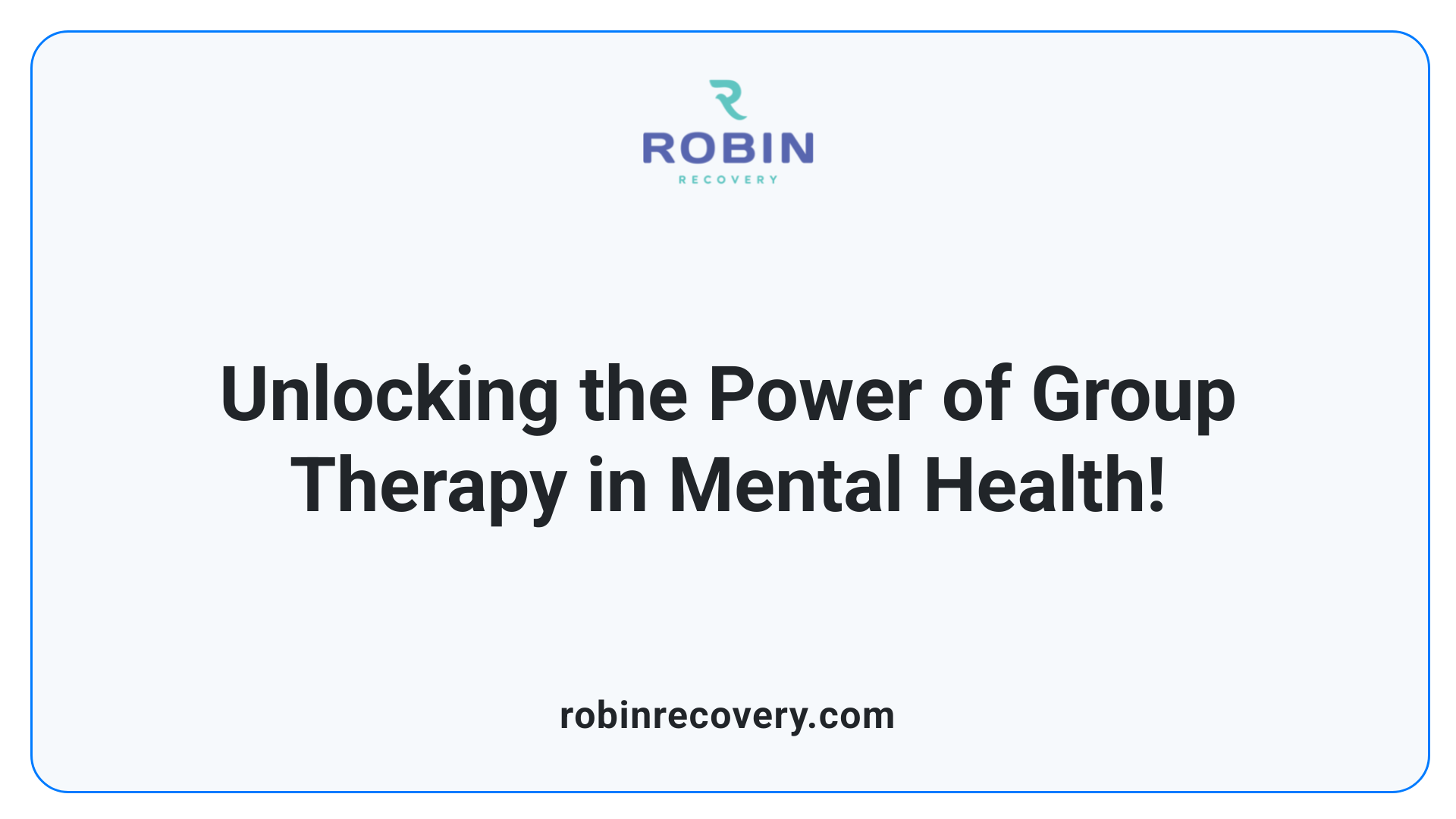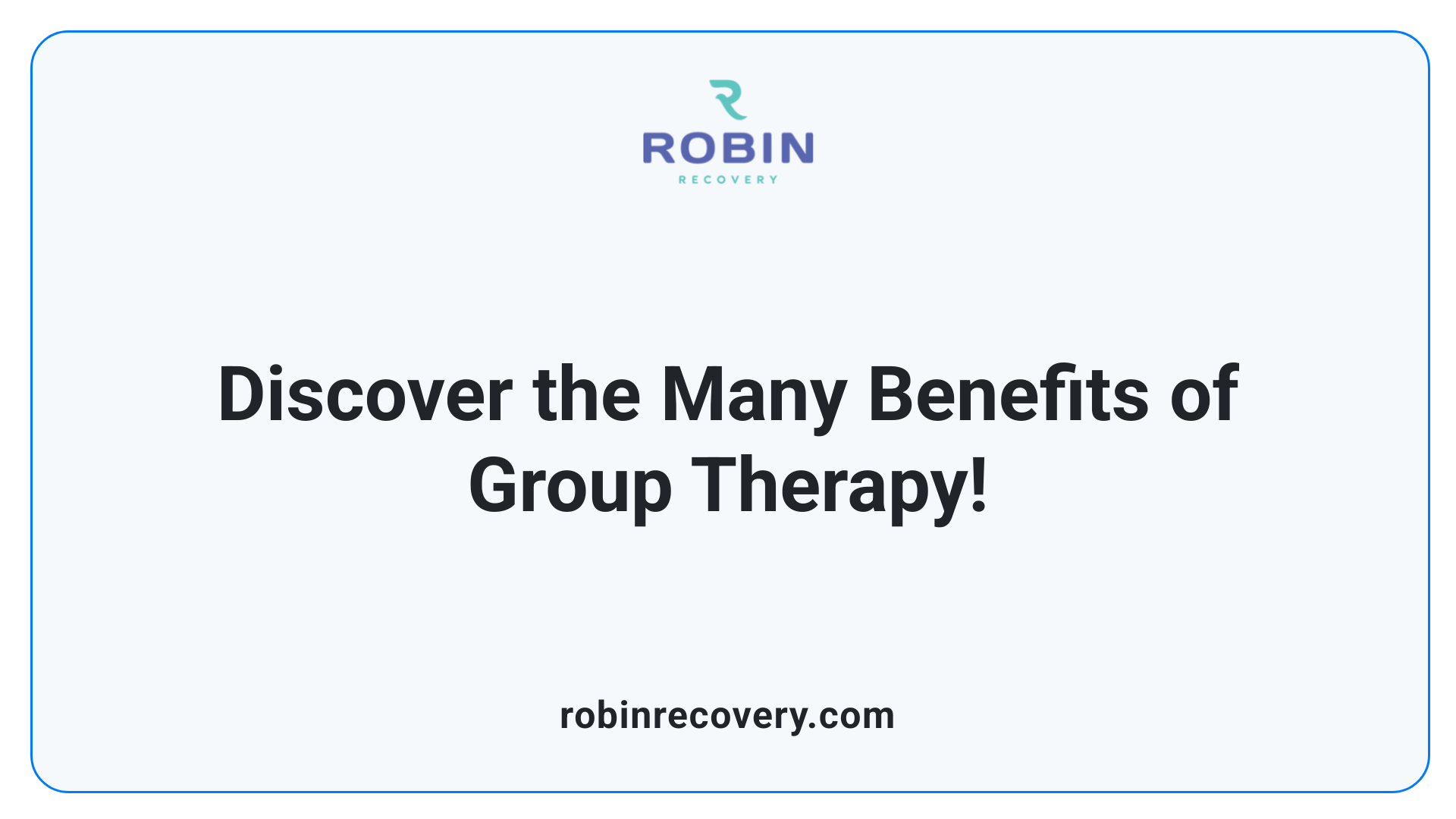The Role of Group Therapy in PHP Programs

Introduction to PHP and Group Therapy
Partial Hospitalization Programs (PHPs) offer a crucial bridge in mental health care, providing intensive treatment while allowing patients to maintain their daily routines. As an integral component of PHPs, group therapy plays a vital role in fostering a supportive community for individuals facing mental health challenges. This article explores the function and significance of group therapy within PHPs, detailing its integration with other therapeutic components and its positive impact on recovery outcomes.
Understanding Partial Hospitalization Programs

What is a Partial Hospitalization Program (PHP) in mental health?
A Partial Hospitalization Program (PHP) is designed for individuals grappling with mental health disorders, addiction, or severe psychological issues. This structured treatment model allows patients to attend a treatment facility while returning home, typically on a daily basis, for intensive treatment sessions. Developed initially by Dr. Albert E. Moll, PHPs emphasize keeping patients connected to their families and communities, which can enhance the effectiveness of treatment.
What services are offered in PHPs?
PHPs provide a wide range of services tailored to individual needs, including:
- Group therapy sessions that promote peer support and shared learning.
- Individual therapy to address personal challenges directly with a counselor.
- Skill-building activities focusing on coping strategies, emotional regulation, and relapse prevention.
- Psychoeducation, equipping patients with knowledge about their conditions and how to manage them.The programs often include specialized treatments such as Dialectical Behavioral Therapy (DBT) and holistic therapies like art and mindfulness practices to support overall well-being.
How are PHPs funded and accessed?
Funding for PHPs typically comes from various sources, including private insurance, Medicare, and Medicaid. This funding model supports a community-based approach, making PHPs more accessible and leading to improved patient outcomes such as lower hospitalization rates. Admission requirements usually involve a professional referral, a thorough evaluation to determine the appropriateness of care, and criteria focused on the individual's mental health challenges.
PHPs serve as a vital bridging point between inpatient hospitalization and outpatient treatment, allowing individuals to receive high-level, structured support while fostering independence in their day-to-day lives.
The Integral Role of Group Therapy in PHPs

What is the role of group therapy in mental health treatment?
Group therapy serves as a cornerstone in mental health treatment, particularly in Partial Hospitalization Programs (PHPs). It creates a structured environment where individuals can openly share their experiences and challenges. This process significantly reduces feelings of isolation, fostering a sense of universality and belongingness.
Participants find comfort in realizing they are not alone in their struggles, which enhances personal growth and emotional well-being. By sharing their stories, members are often able to improve their social skills and interpersonal relationships, whether they are grappling with anxiety, depression, or substance use disorders.
The group therapist plays an essential role in facilitating these sessions. They guide dynamic group processes, addressing both collective and individual challenges, ensuring that therapeutic interventions remain responsive to participants' needs. Critical therapeutic factors such as altruism, where members help each other, and group cohesion contribute to effective engagement and outcomes.
Additionally, incorporating positive psychology into group therapy enriches the therapeutic experience, promoting resilience and overall well-being among participants. Thus, the role of group therapy extends beyond mere support, becoming a transformative aspect of the recovery process in PHP.]
Area of Focus Key Features Benefits! Peer Support Shared experiences reduce isolation. Enhanced sense of community. Therapeutic Dynamics Guided by a skilled therapist responding to group needs. Personalized therapeutic interventions. Skills Development Role-playing, mindfulness practices, and coping strategies. Practical skills applicable in daily life. Integration with Individual Therapy Complements one-on-one sessions for tailored recovery. Well-rounded support approach.
Overall, group therapy within PHPs is essential for healing, helping individuals not only to navigate their challenges but also to grow and thrive in a supportive community.
Benefits of Group Therapy in PHPs

What are the benefits of group therapy in Partial Hospitalization Programs?
Group therapy in Partial Hospitalization Programs (PHPs) offers a wealth of benefits that can significantly enhance both recovery and personal growth.
Community Building and Support
One of the primary strengths of group therapy is its ability to foster a sense of community. Participants connect with others who have shared experiences, reducing feelings of isolation and stigma often associated with mental health and substance abuse issues. This supportive network is vital in helping individuals feel understood and less alone, encouraging open communication and emotional support among members.
Skill Development
In group therapy sessions, participants engage in various therapeutic activities that promote the development of crucial life skills. These include emotional regulation, coping strategies, and effective communication techniques. The collaborative environment allows individuals to receive constructive feedback from peers, further enhancing their personal growth. Role modeling among members provides invaluable inspiration to emulate positive behaviors learned from others.
Social Interaction Benefits
Group therapy also emphasizes the importance of social interaction, which can significantly aid in combatting feelings of anxiety and depression. The structured setting helps participants practice social skills, engage in meaningful conversations, and share personal experiences. This interaction not only uplifts spirits but also cultivates a sense of accountability, motivating members to remain committed to their recovery journeys.
Overall, the collaborative nature of group therapy in PHPs is an essential component that encourages accountability, motivation, and a shared learning experience, which can be pivotal in the healing process.
Diverse Therapeutic Approaches in PHPs

What are the Different Types of Group Therapy?
Group therapy in Partial Hospitalization Programs (PHPs) encompasses various approaches to cater to diverse participant needs. Common types include:
- Cognitive-Behavioral Groups: Focus on understanding the link between thoughts, feelings, and behaviors.
- Psychodynamic Groups: Explore unconscious processes and emotional struggles rooted in an individual’s past.
- Support Groups: Provide a safe space for sharing experiences and facilitating emotional support.
- Mindful Groups: Incorporate mindfulness practices to enhance emotional regulation and present-moment awareness.
What Therapeutic Modalities Go Beyond Traditional Talk Therapy?
In addition to classic talk therapy methods, PHPs often feature:
- Art Therapy: Utilizes creative expression to explore feelings and process experiences.
- Music Therapy: Engages participants in making music to address emotional and psychological needs.
- Drama Therapy: Involves role-playing and performance to facilitate personal insights and social interaction.
How Are Holistic Approaches Integrated?
Holistic methods within PHPs focus on overall wellness and include:
- Mindfulness Exercises: Teach participants to manage stress and emotions effectively.
- Yoga: Promotes physical health, emotional balance, and mental clarity.
- Psychoeducation: Informs participants about their mental health conditions, fostering self-awareness and empowerment.
This variety of therapeutic modalities allows participants to engage in their recovery journey actively, fostering skill development and emotional growth in a supportive community setting.
The Role of Therapeutic Communities in PHPs
Community building and peer support
Group therapy plays an integral part in Partial Hospitalization Programs (PHPs), fostering a sense of community among participants. In these sessions, individuals come together, share experiences, and learn from each other, which significantly aids in reducing feelings of isolation and stigma. The group dynamic helps create a supportive environment where patients can express their thoughts and emotions freely while connecting with peers facing similar challenges.
Additionally, therapeutic communities are crucial for developing accountability. Participants can rely on each other for encouragement, reinforcing their commitment to recovery. This peer support system not only enhances emotional regulation and coping strategies but also nurtures a mutual understanding among group members, making them feel less alone in their struggles.
Patient empowerment and involvement in their recovery
Empowerment is at the heart of what group therapy aims to achieve in PHPs. Patients engage actively in their recovery journeys, participating in structured sessions that emphasize personal growth and autonomy. Through psychoeducation and skill therapy, individuals become more aware of their thoughts and behaviors, boosting their confidence to make meaningful changes in their lives.
This transition towards self-direction is pivotal, as it allows participants to take ownership of their recovery, ultimately leading to a more profound and sustainable healing process. In a PHP, the combination of therapy and community support not only promotes individual empowerment but also cultivates resilience, enabling patients to navigate their paths to wellness.
Transitioning and Continuity of Care in PHPs

Role of PHPs in treatment continuum
Partial Hospitalization Programs (PHPs) play a pivotal role in the treatment continuum for individuals facing mental health challenges. They provide intensive therapy during the day and allow participants to return home overnight, effectively bridging inpatient care and outpatient services. This structured support system is essential for those who are stepping down from more intensive inpatient treatment, helping them maintain their recovery while reintegrating into everyday life.
Transition to other levels of care
Successful completion of a PHP typically leads participants to lower levels of care, such as Intensive Outpatient Programs (IOP) or outpatient treatment. This transition is vital for ensuring continuity in care, enabling individuals to apply the skills they've learned while continuing to receive therapeutic support tailored to their evolving needs. This gradual approach helps mitigate the risk of relapse as patients adjust back to independent living.
Family involvement and support
Family involvement is emphasized throughout the PHP process. Educational components for family members help strengthen familial bonds and establish a supportive network, enhancing the recovery journey. Engaging family members not only fosters communication and rebuilding trust but also reinforces the individual's support system, promoting a holistic approach to recovery.
Conclusion: The Transformative Power of Group Therapy in PHPs
Group therapy within Partial Hospitalization Programs stands out as a transformative force, equipping individuals with essential skills for recovery and reintegration into daily life. By fostering a sense of community and providing diverse therapeutic approaches, group therapy not only supports mental health recovery but also enhances personal growth, social skills, and communication. As PHPs serve as a bridge in the continuum of care, they offer critical support for individuals aiming to regain their independence while maintaining a strong connection to therapeutic resources. The integration of group therapy into these programs continues to prove invaluable in promoting sustainable recovery and well-being.
References
- Benefits of Group Therapy Sessions in PHP & IOP Programs
- How Do Partial Hospitalization Programs (PHPs) Work
- Providing Crisis-oriented and Recovery-based Treatment in Partial ...
- The Role of Partial Hospitalization Programs in the Continuum of Care
- The Role of Therapy in a Partial Hospitalization Program
- Snapshot of a Day in PHP/IOP - Connections Wellness Group
- The Vital Role of Group Therapy in Mental Health Recovery
- Rush Day Hospital | PHP, IOP, Group Treatment
